Power of music gains new meaning
Music is being used as real medicine to treat local people of all ages.
Patients at senior centers, nursing homes and even a children’s hospital are being calmed, stimulated, enriched and delighted by certified music therapists –some of them trained at Florida Gulf Coast University, one of only three Sunshine State schools offering a music therapy major.
Therapists are excited about their work and its potential to go further – to heal pain, reach autistic children and perhaps reignite memory capacity, as evidenced by patients who may not always recognize family members but always know who the music therapist is.
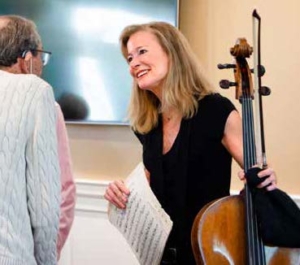 That is because, says Carol Bechtold at The Arlington senior community, music carries all the brain stimuli that make people happy. And better brain health, she adds, boosts quality of life.
That is because, says Carol Bechtold at The Arlington senior community, music carries all the brain stimuli that make people happy. And better brain health, she adds, boosts quality of life.
Bechtold explains music programs remain popular as entertainment for many Arlington residents. But programs for clients with aging issues delve into cognitive skills, blood circulation (from clapping or waving hands) and relief from stress and worry.
On that note, at Moorings Park, Music Therapy Director Devan Elliott leads memory care groups by removing negative lyrics from popular songs and plugging in new, happy ones suggested by clients.
She likes to build routines, starting programs with a “hello” song that asks each patient “How are you?” and “What’s new?” The goal, she explains, is patients opening up with peers and being recognized as important for “who I am.”
For one-on-one therapy sessions, Elliott relies on referrals from nurses or relatives about a patient’s physical pain, anxiety, bereavement or desire to run away. She also is careful to seek advice on what music not to play, to avoid unwitting agitation.
Elliott is a classically trained flutist whose main tools now are the guitar, ukulele, autoharp and mandolin. “I am able to use something I am passionate about to help someone through a difficult time of life,” she says. “It is such an honor.”
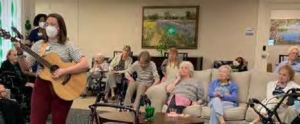 She says Moorings Park values music therapy as “a spoke on the wheel of wellness.” Her office is next to physical workout and rehabilitation areas. She can help a stroke victim learn to walk again with the help of rhythm – step by step.
She says Moorings Park values music therapy as “a spoke on the wheel of wellness.” Her office is next to physical workout and rehabilitation areas. She can help a stroke victim learn to walk again with the help of rhythm – step by step.
At Shell Point Retirement Community in Lee County, the Arts as Healing program allows assisted living and skilled nursing residents access to the new Tribby Art Center’s 400-seat auditorium, art galleries, a sculpture garden and studios. Residents are invited to “Artful Afternoons” that feature tours, special concerts and poetry readings, while artists can also bring lessons, lectures and performances to where residents are.
David Lawrence Centers for Behavioral Health uses various music with patients of all ages.
Is noted geriatrician Dr. Ron Garry of Naples a believer in music therapy? “Yes, yes, yes,” he says. “The smile that happens when patients with Alzheimer’s disease hear their favorite music is priceless. If we could only do that long term.”
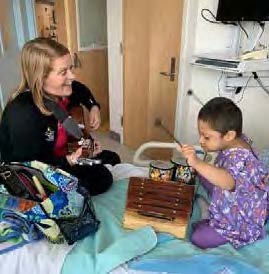 At Golisano Children’s Hospital, music helps patients and families relax where everything is strange and beyond their control.
At Golisano Children’s Hospital, music helps patients and families relax where everything is strange and beyond their control.
Music therapist Tracey Failla’s work, funded by philanthropy, collaborates with doctors to counter anxiety, pain and isolation, while helping teach lessons on colors, numbers and animals.
Youngsters, she says, choose the music and can accompany rhythms.
The Naples Senior Center, Manager of Dementia Respite Activities and music therapist Marisa Luizzi traces her craft to ancient times when people were awed by the ground and musical instruments vibrating, likening music to our bodies’ heart rhythm.
At her daily sessions with dementia patients, Luizzi turns tunes such as Louis Armstrong’s “Wonderful World” into a group conversation about the artist, his life and the uplifting lyrics. “Everybody’s happy,” she says, adding Name That Tune games are also big hits.
“Every little thing that we do matters to them,” she says.
And there’s more. A big goal is forming a chorus of dementia patients, caregivers and the public when the center moves to larger space in North Naples.
“Music will not cure loss of memory,” Luizzi emphasizes. “But music engages the memories that are there and can stimulate the possibility of a newmemory.”
“I love what I do,” she says. “I don’t work a single day in my life.”

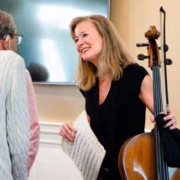


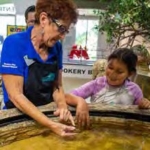
Leave a Reply
Want to join the discussion?Feel free to contribute!